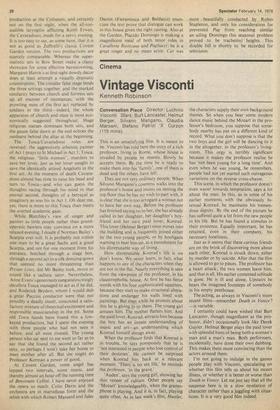Cinema
Vintage Visconti
Kenneth Robinson
Conversation Piece Director: Luchino Visconti Stars: Burt Lancaster, Helmut Berger, Silvano Mangano, Claudia Marsani, Stefano Patrizi 'X' Curzon (119 mins).
This is an unsatisfying film. It is meant to be. Visconti has told here the story of a rich professor, living in Rome, whose house is invaded by people he resents. Slowly he accepts them. By the time he is ready to make them into his 'family', one of them is dead and the others have left.
They are not very ordinary people. When Silvano Mangano's countess walks into the professor's house and insists on renting the top floor that he has no wish to part with, it is clear that she is too arrogant a woman not to have her own way. Before the professor has finished saying no to her, she has already called in her daughter, her daughter's boyfriend and her own paid lover, Konrad. This lover (Helmut Berger) soon moves into the building and is frequently joined either by the two young people, or by hooligans wanting to beat him up, as a punishment for his disreputable way of living.
How disreputable Konrad's life is we don't know. We never learn, in fact, what happens to any of the characters when they are not in the flat. Nearly everything is seen from the viewpoint of the professor, in his claustrophobic house. At first he has fierce words with his four sophisticated squatters, because they start to make structural alterations and endanger his walls lined with paintings. But even while he protests about this he is giving in to them. The young girl amuses him. The mother flatters him. And the paid lover, Konrad, attracts him because the boy has an innate understanding of music and art—an understanding which Konrad himself shrugs away.
When the professor finds that Konrad is in trouble, he says pompously that he is 'not interested in people who lose control of their destinies'. He cannot be surprised when Konrad hits back at a relevant moment. 'There is no sex life,' he reminds the professor, 'in the grave.'
'Auden', says the young girl, showing her thin veneer of culture. Other people say 'Mozart' knowledgeably, when the gramophone is playing. And it is, in fact, playing quite often. As in last week's film, Hustler, the characters supply their own background themes. So when you hear some modern dance music behind the Mozart in the professor's bedroom, you suppose that somebody nearby has put on a different kind of record. What you don't suppose is that the two boys and the girl will be dancing to it in the altogether, in the professor's livingroom. This orgy is terribly significant because it makes the professor realise he has 'not been young for a long time'. And even when he was young, he remembers, people had not yet started such outrageous variations on the reverse cross-chasse.
This scene, in which the professor doesn't even waver towards temptation, says a lot about the man. In this, as in some of his earlier moments with the obviously bisexual Konrad, he maintains his tremendous dignity. By tfie end of the picture he has suffered quite a lot from the new people in his life. But he has found a stimulus in their existence. Equally important, he has retained, even in their company, his necessary loneliness.
Just as it seems that these curious friends are on the brink of discovering more about each other, Konrad is struck down, either by murder or by suicide. After that the film is allowed to go to pieces. The professor has a heart attack; the two women leave him, and that is all. His earlier contented solitude is gone. He is ill and alone. Upstairs he hears the imagined footsteps of somebody in his empty penthouse.
The acting, as always in Visconti's more recent films—remember Death in Venice? —is variable.
I certainly could have wished that Burt Lancaster, though magnificent as the professor, didn't occasionally look like Derek Guyler. Helmut Berger plays the paid lover with splendid hints of being both a woman's man and a man's man. Both performers, incidentally, have done their own dubbing. This makes them more convincing than the actors around them.
I'm not going to indulge in the games people play with Visconti, speculating on whether this film tells us about his recent illness, or whether it is better or worse than Death in Venice. Let me just say that all the suspense here is in a slow revelation of character rather than a juggling with situations. It is a very good film indeed.


































 Previous page
Previous page